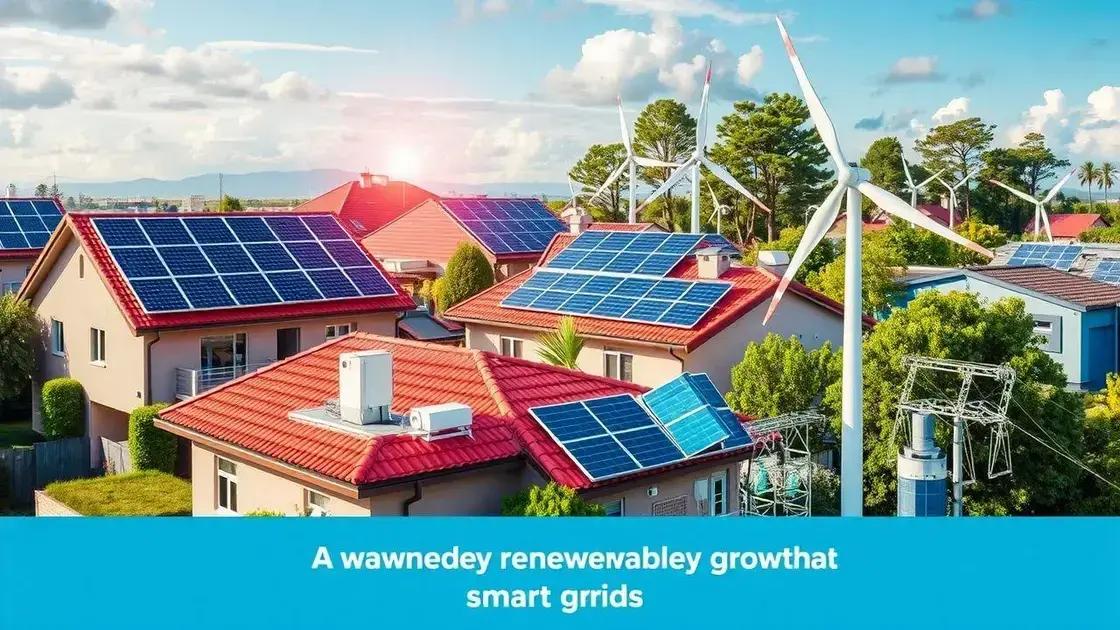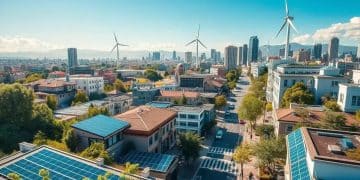Renewable energy expansion – emerging trend shaping our future

Renewable energy expansion integrates advanced technologies and supportive government policies, driving growth in clean energy markets while reducing pollution and promoting sustainability.
Renewable energy expansion is not just a buzzword; it’s a transformative force reshaping our planet. Curious about how this shift impacts your life? Let’s dive into its significance and explore the exciting developments ahead.
why renewable energy expansion matters
Understanding why renewable energy expansion matters is crucial for everyone today. This shift not only benefits the environment but also impacts our economy and quality of life.
Environmental Benefits
One of the main reasons for this expansion is its positive effect on the planet. Traditional energy sources, like coal and oil, pollute our air and water. In contrast, renewable sources such as solar, wind, and hydroelectric energy offer cleaner alternatives.
- Reduces greenhouse gas emissions.
- Minimizes air and water pollution.
- Preserves natural resources for future generations.
Additionally, by transitioning to renewables, we can mitigate climate change effects. This means fewer extreme weather events, which often disrupt communities.
Economic Impact
Another important aspect is the economic growth associated with renewable energy. As more countries invest in these technologies, job opportunities have increased significantly.
- Creation of new jobs in solar and wind sectors.
- Increase in local investments.
- Stimulation of technological innovation.
These factors indicate that a focus on renewable energy is vital for sustainable economic development. Furthermore, it reduces dependence on imported fuels, leading to greater energy security.
In addition to environmental and economic advantages, people are becoming more aware of how renewable energy expansion influences their daily lives. It’s not just about how we power our homes but also how we shape our future. By embracing this change, we can create a harmonious balance between nature and technology.
key technologies driving renewable energy growth

Several key technologies are at the forefront of the renewable energy growth movement. These innovations not only enhance energy production but also make it more efficient and accessible.
Solar Power Technologies
Solar energy is becoming one of the most popular sources of renewable energy. Advances in solar panel designs and materials have made them more efficient than ever.
- Photovoltaic (PV) solar panels convert sunlight directly into electricity.
- Concentrated solar power (CSP) systems use mirrors to focus sunlight to generate thermal energy.
- Innovative solar technologies, such as solar shingles, are integrated into building materials.
These innovations allow homeowners and businesses to harness the sun’s energy effectively.
Wind Energy Innovations
Another significant technology in renewable energy is wind power. Wind turbines have evolved drastically, increasing their capacity and efficiency.
- Horizontal-axis wind turbines are the most common, harnessing wind from multiple directions.
- Vertical-axis wind turbines offer versatility and can be easier to maintain.
- Offshore wind farms are expanding, tapping into strong, consistent ocean winds.
As these technologies grow, they contribute to broader energy networks and help reduce reliance on fossil fuels.
Energy storage technology is also crucial for the enhancement of renewable energy. Batteries and storage systems allow excess energy collected during peak production times to be stored for later use, making energy usage more flexible and reliable.
Smart Grid Technology
Smart grid technology plays a critical role in integrating renewable energy into existing power systems. It helps in managing electricity demand and supply while minimizing outages.
- Smart meters provide real-time data to consumers and providers.
- Advanced sensors and AI optimize energy distribution.
- Demand response technologies balance energy loads based on consumption patterns.
These advancements support a sustainable energy future, making renewable sources more viable and efficient for everyday use.
government policies supporting renewable energy
Government policies play a vital role in promoting renewable energy. These policies not only encourage investment but also create a supportive environment for sustainable practices.
Incentives for Renewable Energy Adoption
Many governments offer incentives to encourage the use of renewable energy. These can take various forms, including tax credits, rebates, and grants for businesses and homeowners.
- Tax credits for solar panel installation reduce upfront costs.
- Rebates for energy-efficient appliances motivate consumers to invest in clean energy.
- Grants support research and development in renewable technologies.
These incentives can significantly lower the financial barriers to adopting renewable energy solutions.
Regulations Promoting Clean Energy
Regulatory frameworks are crucial for guiding the growth of renewable energy. Governments implement laws and standards that mandate the use of clean energy sources.
- Renewable portfolio standards require utilities to obtain a certain percentage of their energy from renewable sources.
- Feed-in tariffs guarantee fixed payments for energy fed back into the grid from renewable sources.
- Carbon pricing initiatives incentivize reductions in greenhouse gas emissions.
Such regulations ensure that renewable energy remains a priority in national and local energy policies.
Additionally, international agreements, like the Paris Agreement, push countries to commit to reducing their carbon emissions. These commitments often lead to better support for renewable energy initiatives at home.
Research and Development Support
Governments also invest in research to advance renewable technologies. Funding for innovation helps drive down costs and improve efficiency.
- Public-private partnerships bring resources together for large-scale projects.
- Funding for universities supports clean energy research initiatives.
- Innovation hubs foster collaboration among tech companies and research institutions.
Through these efforts, governments can accelerate the transition to a sustainable energy future.
the future of renewable energy markets

The future of renewable energy markets is bright and full of potential. As technology advances and demand grows, we can expect to see significant changes in how energy is produced, distributed, and consumed.
Market Trends Favoring Renewables
One of the key trends is the declining cost of renewable technologies. Prices for solar panels and wind turbines have dropped dramatically over the past decade. This trend is making renewable energy more accessible to both consumers and businesses.
- Increased efficiency in production processes.
- Government subsidies promoting clean energy accessibility.
- Global investments shifting toward renewable sectors.
These factors are driving a transition away from fossil fuels, leading to a more sustainable energy landscape.
Decentralized Energy Production
The rise of decentralized energy systems is another important aspect of the future. Homeowners and businesses can produce their own energy using solar panels or small wind turbines. This shift is changing the traditional energy model.
Decentralization offers numerous benefits, including reduced transmission losses and increased energy security. Communities can become more resilient by relying on locally-generated power.
Integration of Smart Technology
Smart technology will also play a crucial role in the future of renewable energy markets. Smart grids will allow for better management of energy resources, optimizing distribution and consumption.
- Real-time data sharing will improve efficiency.
- Smart meters will help consumers monitor their energy use.
- Automation can reduce waste and enhance reliability.
By embracing these technologies, we can enhance the effectiveness of renewable energy systems and adapt to changing energy demands.
As demand for cleaner energy continues to rise, the future of renewable energy markets looks promising. The ongoing innovations and policies will shape how we power our homes, businesses, and communities in the years to come.
In conclusion, the shift towards renewable energy markets is not just a trend; it’s a pivotal change for our planet and economy. The advancements in technology, supportive government policies, and growing awareness of environmental issues are driving this transformation. As we embrace these changes, we will create a sustainable future that benefits everyone. By investing in renewable energy, we can reduce our reliance on fossil fuels, mitigate climate change, and power the world with clean, sustainable sources.
FAQ – Frequently Asked Questions About Renewable Energy
What are the main benefits of renewable energy?
Renewable energy reduces greenhouse gas emissions, decreases air pollution, and provides sustainable power sources for the future.
How do government policies support renewable energy?
Governments promote renewable energy through incentives, tax credits, and regulations that encourage the adoption of clean energy technologies.
What technologies are driving renewable energy growth?
Key technologies include solar panels, wind turbines, and smart grid systems, which enhance energy efficiency and decrease production costs.
What trends can we expect in renewable energy markets?
Expect growth in decentralized energy production, advancements in storage technology, and increasing investments in clean energy solutions.





